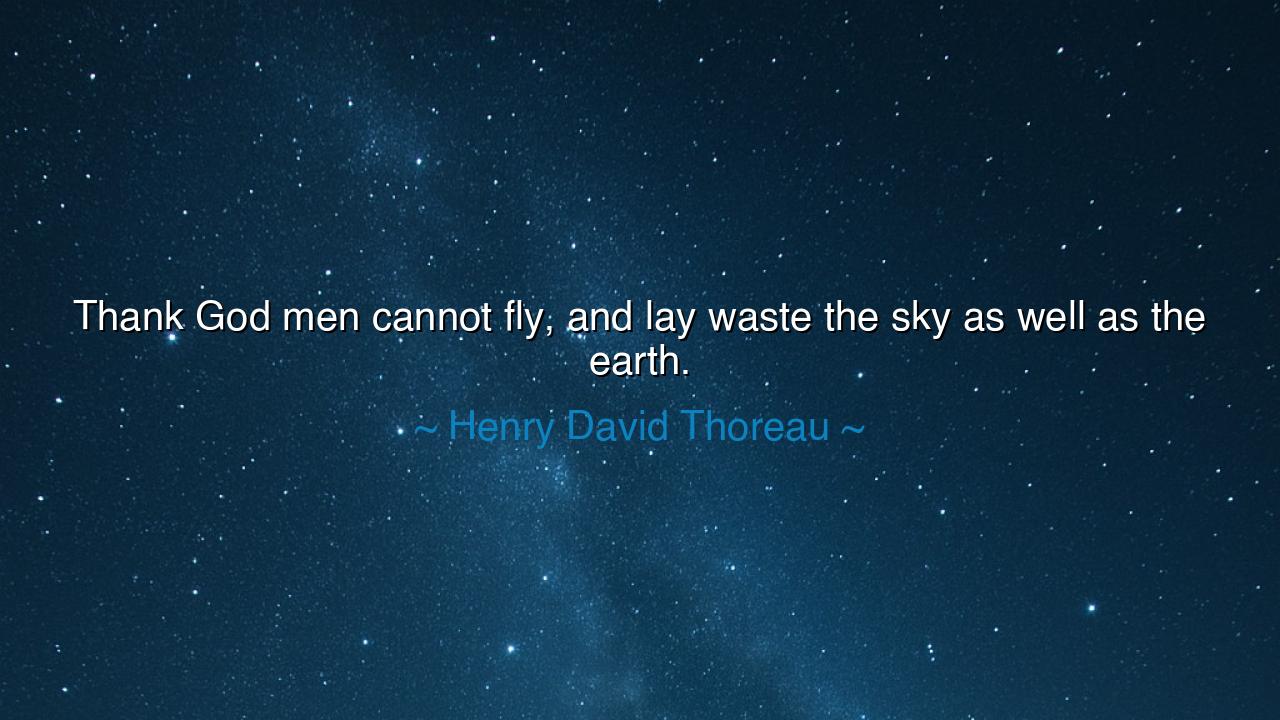
Thank God men cannot fly, and lay waste the sky as well as the






When Henry David Thoreau wrote, “Thank God men cannot fly, and lay waste the sky as well as the earth,” he spoke not merely as a poet of nature, but as a prophet of conscience. These words, born in an age before the conquest of flight, were a prayer and a warning. Thoreau saw clearly what others did not—that the hunger of mankind to dominate, to possess, to control, knows no bounds. If given the sky, he feared, we would defile it as we have defiled the ground beneath our feet. His words are an elegy for innocence, and a call to humility—to remind humankind that what is sacred must not be conquered, but cherished.
The origin of this quote lies in the heart of Thoreau’s lifelong devotion to nature. Living by the still waters of Walden Pond, he sought not wealth nor renown, but understanding. He observed the woods, the winds, and the wild creatures, and he saw in them a purity untouched by the corruption of human greed. He beheld the earth, once abundant, scarred by axes and factories. He saw rivers clouded by waste, and fields stripped bare for gain. And in this vision, he uttered his fearful gratitude—that at least the sky, vast and unspoiled, remained beyond our reach.
How tragic, then, that time would prove him right. For men did learn to fly. They soared through the heavens, not with reverence, but with conquest in their hearts. The dream of flight, once divine, became an extension of dominion. The sky that once belonged to the birds now roars with engines; the heavens, once symbols of mystery and freedom, now bear the scars of smoke and war. Thoreau’s fear has become our reality: we have laid waste to the sky as well as the earth, filling the air with poison and the heavens with debris.
Consider the story of Rachel Carson, who, a century after Thoreau, raised her voice against the silent ruin spreading through creation. In her book Silent Spring, she revealed how mankind’s chemical warfare upon insects had poisoned the birds, the rivers, and the very air. Her words awoke the conscience of a generation, reminding them that to harm the earth is to wound ourselves. Like Thoreau, she spoke against arrogance—the belief that humanity stands above nature rather than within it. Through her courage, the seeds of the modern environmental movement were sown.
Thoreau’s wisdom speaks to something deeper than pollution or industry; it speaks to hubris, the ancient sin of believing ourselves gods. The sky has always been sacred to humanity—the realm of the divine, the dwelling of the stars, the symbol of eternity. To desire mastery over it is to forget our place in the order of creation. The ancients looked upward and prayed; we look upward and plan. Yet the heavens are not ours to own. They remind us that there are realms beyond reach, and that reverence, not conquest, is the highest form of wisdom.
Still, Thoreau’s words need not be read as despair. Beneath his lament lies a spark of hope—for gratitude itself is the beginning of redemption. To thank God is to recognize that not all has been lost, that beauty yet remains, and that we possess the power to protect it. Even now, the skies can be healed; the earth can breathe again. The same hands that pollute can plant; the same hearts that destroy can choose restraint.
So let this teaching be carried to all who walk the earth: tread lightly, and look upward with humility. Be as the birds, who fly not to conquer the air, but to dwell within it in grace. Let every person remember that the world was not made for domination, but for harmony. The earth is not a quarry to be mined, nor the sky a battlefield to be conquered—they are the twin sanctuaries of life, and our duty is to preserve them.
Thus, in the spirit of Thoreau, we must become guardians of what remains. Let us cherish the ground beneath and the heavens above, not as property, but as gift. For the day we learn again to stand in awe before the sky, to breathe deeply of the clean wind, and to give thanks rather than take, will be the day we restore the sacred balance of the world. Then, and only then, will humanity be worthy of both the earth and the sky.






AAdministratorAdministrator
Welcome, honored guests. Please leave a comment, we will respond soon